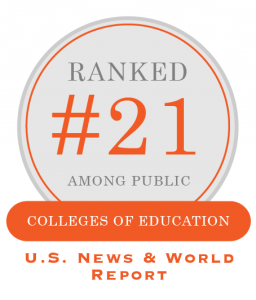The University of Florida College of Education improved nine spots to No. 21 among public education colleges in the 2015 U.S. News and World Report rankings of America’s Best Graduate Schools. The UF college was rated 30th overall, 10 spots higher than last year.
U.S. News also rated two College of Education academic programs—special education and counselor education—among the nation’s top five in their respective specialty areas. Both ranked fifth in their disciplines, with special education moving up one spot from No. 6 last year, and counselor education improving three positions from No. 8.
Two other UF education specialties gained top 20 ratings: in elementary teacher education (up two spots to 16th), and curriculum and instruction (holding steady at 18th).
“Seeing this rise in the rankings is a testament to the intellectual leadership of our faculty, the enthusiasm of our students, and our ambitious research agenda that addresses the most critical needs in education and our global society,” said UF education Dean Glenn Good. “The real payoff is our impact within the broader community as evidenced by the high quality of our graduates, the engagement of our school and district partners, and the accomplishments of our alumni.”
The University of Florida remains Florida’s highest ranked education school. Florida State runs second with a national rank of 39th, followed by the University of Miami at No. 51. UF’s college also is the highest ranked public education school in the Southeastern Conference.
The UF College of Education showed significant improvements in several of the quality measures assessed in the rankings, including the two measures for faculty research activity (averaged over the past two fiscal years)—total research expenditures ($21.9 million, more than $4 million than the previous two-year average) and research expenditures per faculty member ($336,500, a 34 percent increase)
“Our faculty have increased external research funding every year over the past six years, reaching our highest level ever in 2013,” Good said.
According to the U.S. News rankings, the College of Education also improved its scores in doctoral student selectivity with an applicant acceptance rate of 34 percent, and in the ratio of full-time doctoral students to full-time faculty members (4.3 to 1).
Assessment by peers (deans and deans of graduate studies at U.S. education colleges) stood pat with a rating of 3.6 on a scale of 5. Mean GRE scores of doctoral students entering in fall 2013 varied slightly from 2012, with verbal scores dropping two points to 153 and quantitative scores averaging seven points higher at 154.
The college’s overall score of 61—with the top-ranked college scoring 100—was a two-point improvement over last year.
The complete U.S. News Best Graduate Schools rankings data are available online at: http://www.usnews.com/education
CONTACTS
SOURCE: Tom Dana, assistant dean of academic affairs, UF College of Education, tdana@coe.ufl.edu, 352-273-4134
WRITER: Larry Lansford, director, news and communications, UF College of Education; llansford@coe.ufl.edu; 352-273-4137